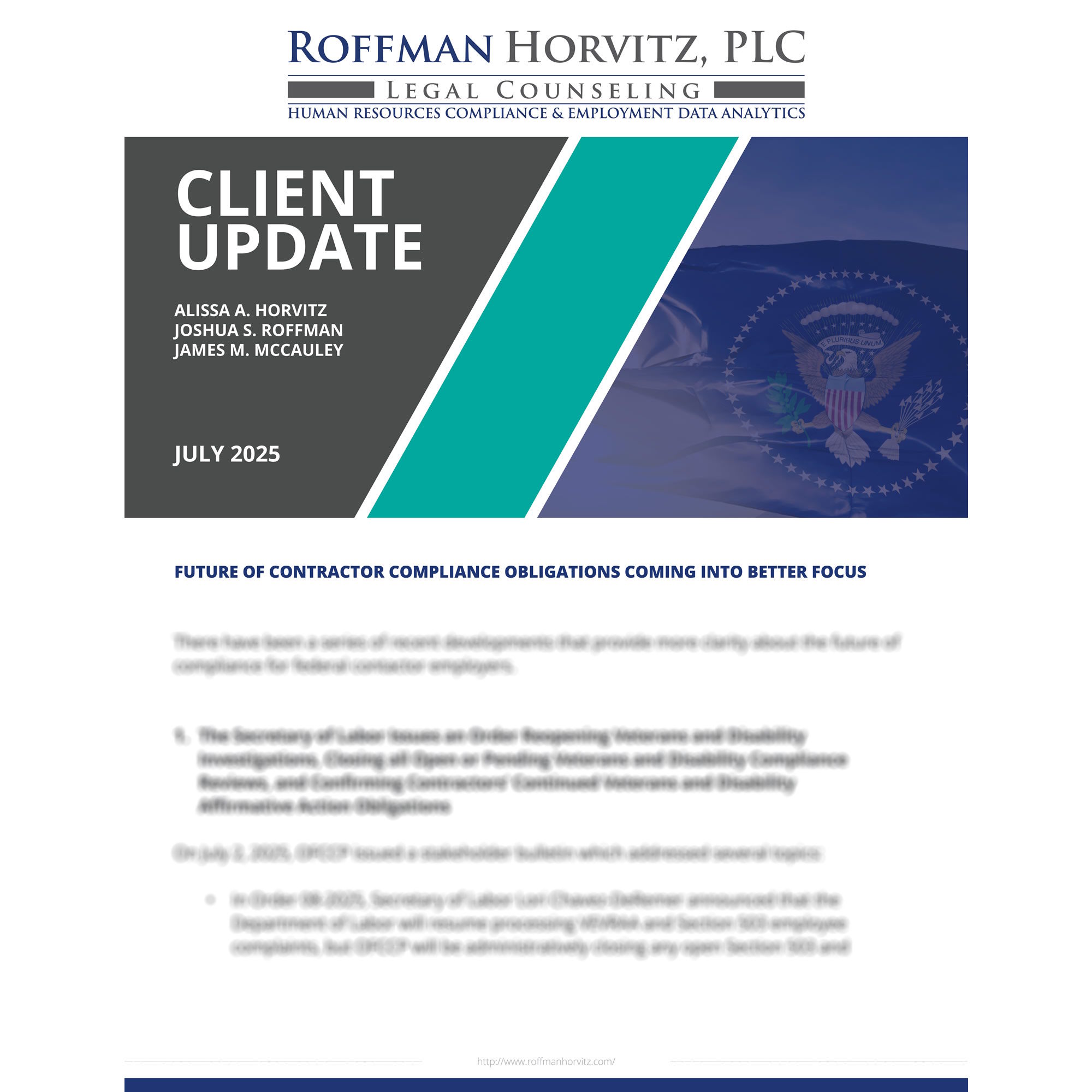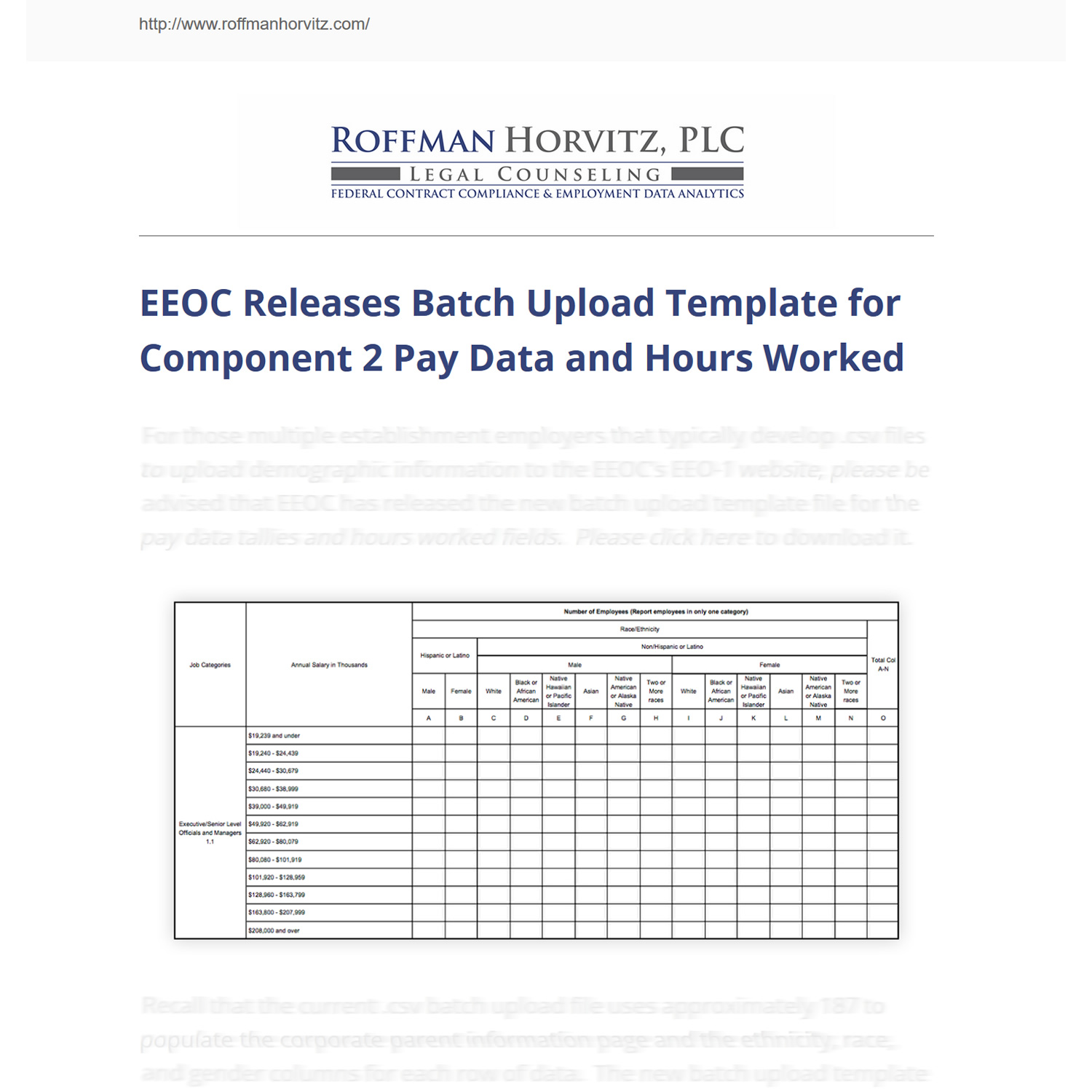Directive (DIR) 2019-05
U.S. DEPARTMENT OF LABOR
Office of Federal Contract Compliance Programs
A Directive (DIR) is intended to provide guidance to OFCCP staff or federal contractors on enforcement and compliance policy or procedures. A DIR does not change the laws and regulations governing OFCCP's programs and does not establish any legally enforceable rights or obligations.
Effective Date: September 05, 2019
- SUBJECT: Contractors' Obligations Regarding Students in Working Relationships with Educational Institutions.
- PURPOSE: To announce that OFCCP will exercise its enforcement discretion by limiting its compliance evaluations of educational institutions to non-student employees, while still accepting complaints alleging employment discrimination by and on behalf of student workers who qualify as employees under the relevant legal tests.
- REFERENCES:
- Executive Order (EO) 11246, as amended.
- Section 503 of the Rehabilitation Act of 1973, as amended (Section 503).
- Vietnam Era Veterans' Readjustment Assistance Act of 1974, as amended (VEVRAA).
- 41 CFR Chapter 60, Office of Federal Contract Compliance Programs, Equal Employment Opportunity, Department of Labor.
- Federal Contract Compliance Manual (FCCM) (Oct. 2014).
- Frequently Asked Questions: Employer-Employee Relationship, https://www.dol.gov/ofccp/regs/compliance/faqs/EmpRelationship.html (last checked May 20, 2019).
- AFFECTED POLICY: The procedures in this Directive supersede any procedures in the FCCM or other previously issued guidance to the extent they could be read to conflict.
- BACKGROUND: OFCCP enforces EO 11246, Section 503, and VEVRAA. Collectively, these laws prohibit federal contractors and subcontractors from discriminating on the basis of race, color, religion, sex, sexual orientation, gender identity, national origin, disability, or status as a protected veteran, and set affirmative action requirements. Contractors also are prohibited from discriminating against applicants or employees because they inquire about, discuss, or disclose their compensation or that of others, subject to certain limitations.
OFCCP recognizes that educational institutions present unique circumstances and require additional guidance. To that end, OFCCP will soon publish a Technical Assistance Guide (TAG) for educational institutions that will assist them in meeting their obligations under the laws and regulations that OFCCP enforces and will provide clarifying guidance for educational institutions in their development of affirmative action programs (AAPs). The TAG will also assist them in preparing for scheduled compliance evaluations, and serve as a valuable self-assessment tool in reviewing their employment policies and practices to meet their nondiscrimination and affirmative action requirements.
One particular question that has arisen in the context of contractors that are educational institutions is whether various types of student workers are "employees" under the laws OFCCP enforces, and thus whether these students should be included in contractors' AAPs. OFCCP has addressed in guidance the broader question of which individuals qualify as employees for AAP purposes, stating that contractors should be guided by the test set forth in a 1992 U.S. Supreme Court decision, Nationwide Mutual Insurance Co. v. Darden, 503 U.S. 318 (1992).1 OFCCP has not previously issued guidance specific to the question of the employment status of students who hold a working relationship with their educational institution.
For student workers, there is no single answer to the question of employee status under OFCCP's laws given the many different fact-specific inquiries required under the applicable legal tests.2 For example, with regard to graduate student assistants such as teaching assistants and research assistants, courts have "typically refused to treat them as ‘employees' for Title VII purposes only where their academic requirements were truly central to the relationship with the institution."3 However, based on the particular facts at issue, courts have reached various outcomes on the ultimate question of these students' employee status.4
Similarly, work-study students require fact-specific determinations that reviewing bodies have interpreted differently.5
Against this legal backdrop, OFCCP appreciates the difficulty for educational institutions in determining whether student workers meet the multifactor tests for employee status, and accordingly whether such employees should be included in their AAP job groups. OFCCP faces similar difficulties making these determinations when these entities are scheduled for compliance evaluations. Sorting through data to determine jurisdiction on student workers is not only burdensome for contractors but may prolong the time it takes OFCCP to complete compliance evaluations, and may take focus away from examining the personnel practices and outcomes of non-student employees of these contractors. Additionally, data on student workers is typically not robust enough for analyses due to quick turnover and limited application pools. OFCCP has an interest in focusing its time, attention, and resources on individuals whose primary relationship with the educational institution is work-related. - ROLES AND RESPONSIBILITIES:
Regional and Field Staff: It is the responsibility of regional and field offices staff to review contractor AAPs and employment activity data in compliance evaluations consistent with this Directive, such that data on student employees are not considered in the determination of violations. For any complaints filed by and on behalf of student workers at educational institutions that are covered contractors, regional and field office staff will work with the Office of the Solicitor, as appropriate, to determine whether such students are employees under, and thus protected by, OFCCP's laws.
National Office: It is the responsibility of OFCCP's national office staff involved in compliance evaluations to act in accordance with the procedures stated in this Directive. - POLICY: In light of the above, as an exercise of its enforcement discretion, OFCCP will not cite violations for excluding student workers from AAPs or personnel activity data submissions in compliance evaluations. OFCCP will, however, continue to accept and consider complaints filed by and on behalf of student workers at these educational institutions, and its evaluations of the employee status of any such student workers will be guided by the Darden factors and other legal principles discussed above.
- ATTACHMENTS: None.
- INTERPRETATION: This Directive does not create new legal rights or requirements or change current legal rights or requirements for contractors. EO 11246, Section 503, VEVRAA, OFCCP's regulations at 41 CFR Chapter 60, and applicable case law are the official sources for contractors' compliance responsibilities. Nothing in this Directive is intended to change otherwise applicable laws, regulations, or other guidance or to restrict or limit OFCCP's ability to perform compliance evaluations, request data, or pursue enforcement of any issue within its jurisdiction. This Directive applies to all open compliance reviews that have not been referred to the Office of the Solicitor for enforcement as of the effective date of this Directive, as well as all compliance reviews opened after the effective date.
/S/
Craig E. Leen
Director
Office of Federal Contract Compliance Programs
1 OFCCP generally uses the common-law agency test for determining who is an employee under OFCCP programs. See Frequently Asked Questions: Employer-Employee Relationship, https://www.dol.gov/ofccp/regs/compliance/faqs/EmpRelationship.html (last checked May 20, 2019). No one factor under the Darden test is decisive, but some examples include the extent to which the educational institution controls the individual's work schedule, the duration of the relationship between the parties, and the method of payment the individual receives. The full list of factors is provided in OFCCP's FAQ on the topic.
2 OFCCP notes that the position of DOL's Wage and Hour Division (WHD), which enforces the Fair Labor Standards Act (FLSA), is that "an employment relationship will generally exist with regard to students whose duties are not part of an overall educational program and who receive some compensation." WHD, Field Operations Handbook sec. 10b24(b), https://www.dol.gov/whd/FOH/FOH_Ch10.pdf ((last checked May 20, 2019). In addition, WHD does not assert an employer-employee relationship under the FLSA between an educational institution and graduate research assistants who perform research under faculty supervision while fulfilling the requirements of advanced degrees. Id. sec. 10b18.
3 Cuddeback v. Florida Bd. of Educ., 381 F.3d 1230, 1235 (11th Cir. 2004) (holding that a graduate research assistant was an employee after examining several factors comprising the "economic realities" of the position, including receipt of a stipend, equipment, and training from the university).
4 Id. (citing Stilley v. Univ. of Pittsburgh of the Commonwealth Sys. of Higher Educ., 968 F. Supp. 252, 261-62 (W.D. Pa. 1996) (finding that a plaintiff was an employee when she was a student researcher); Ivan v. Kent State Univ., 863 F. Supp. 581, 585–86 (N.D. Ohio 1994) (finding that a graduate student researcher was an employee where she was under an employment contract, was paid biweekly, and had retirement benefits withheld); Jacob-Mua v. Veneman, 289 F.3d 517, 520–21 (8th Cir. 2002) (concluding that a volunteer graduate student researcher was not an employee because she was not financially compensated for her work), abrogated on other grounds by Torgerson v. City of Rochester, 643 F.3d 1031 (2011) (en banc); Pollack v. Rice Univ., No. H-79-1539, 1982 WL 296 (S.D. Tex. Mar. 29, 1982) (finding that paid research or instruction by the plaintiff was "attendant to his capacity as a graduate student" because it was a central part of the graduate program and, therefore, the plaintiff's status was that of "student" rather than "employee")).
5 For example, one Second Circuit case, addressing a scenario in which a university student brought a Title VII claim against a hospital where she interned while receiving work-study funds through her university, found that the lack of remuneration by the hospital meant that there was no employee-employer relationship. O'Connor v. Davis, 126 F.3d 112 (2d Cir. 1997). However, the precedential weight of O'Connor has subsequently been brought into question. See Pemrick v. Stracher, 67 F. Supp. 2d 149, 161–66 (E.D.N.Y. 1999) (noting that in Pietras v. Board of Fire Comm'rs of Farmingville Fire Dist., 180 F.3d 468, 473 (2d Cir. 1999), the Second Circuit held a volunteer was an employee under Title VII even though the benefits were provided by a third party and noting O'Connor was "significantly weakened" in light of the same). And conversely, in a decision by the Equal Employment Opportunity Commission's Office of Federal Operations, paid work-study students were found to be employees under Title VII after applying a common law test derived from the Darden factors. Kristofer v. Veterans Affairs, Appeal No. 0120170140, 2016 WL 7209389 (EEOC Nov. 29, 2016) (overruling final agency decision that a work-study student in a rehabilitation program lacked standing because he was a student beneficiary rather than employee, and holding there were "sufficient circumstances in the record indicative of an employer/employee relationship" based on the factors in Ma v. Dep't of Health & Human Services, Appeal Nos. 01962389 & 01962390, 1998 WL 295965 (EEOC May 29, 1998)).
The contents of this document do not have the force and effect of law and are not meant to bind the public in any way. This document is intended only to provide clarity to the public regarding existing requirements under the law or agency policies.
Last updated on September 05, 2019
Download a PDF version (from the OFCCP site)

